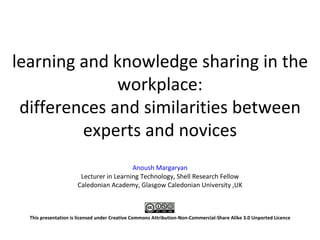
Learning and knowledge sharing in the workplace
- 1. learning and knowledge sharing in the workplace: differences and similarities between experts and novices Anoush Margaryan Lecturer in Learning Technology, Shell Research Fellow Caledonian Academy, Glasgow Caledonian University ,UK This presentation is licensed under Creative Commons Attribution-Non-Commercial-Share Alike 3.0 Unported Licence
- 4. What is being learned? How is it learned? What is the role of the collective in learning?
- 5. Context: Global knowledge sharing networks Period: Sept 08-Apr 09 Method: Questionnaire & interviews Survey: n=462 (E46%; N27% ) Interviews: n=29 (E41%, N31%, 28%M)
- 6. What is being learned in the workplace? Awareness and Understanding Role Performance Understanding background of projects (NNNM) Delegation skills (M) Workplace politics (NM) People management skills (N) Stakeholder engagement (EM) Time management and prioritising (N) Contextualising knowledge (MMEE) Project management (EEM) Personal Development Teamwork Assertiveness (M) Collaboration skills (EEEMN) Learning about oneself (E) Virtual team working (N) Self-confidence (EE) Stress management (M) Task Performance Lab skills (N) Core knowledge Using company-specific technology (NNE) Technical knowledge related to core tasks (NNNMMEE) Enculturation in the company Using knowledge resources: developing personal Developing visibility in the company (M) networks (M), knowing who to ask (N) Understanding the big picture (N) Working in the organisation (NNNME)
- 7. How is it learned? Type No E N M Formal learning 25/29 67% 100% 88% “By doing” 20/29 50% 100% 63% Discussions with 9/29 17% 44% 38% others Coaching &mentoring 7/29 8% 44% 25% By teaching others 6/29 17% 33% 13% By observing others 6/29 17% 45% 0% By trial and error 5/29 8% 22% 25% Self-study 4/29 0% 33% 13%
- 8. Significant others in the workplace • Line Manager (16/29) • Colleagues in the organisation (15/29) • Mentor (10/29) • Colleagues in the team (9/29) • Coach (6/29) • Senior managers (3/29) • ‘Externals’ (supplier, professor) (2/29)
- 9. The role of the collective (1) “The networking through the course is very important because you meet other economists so immediately you have a list of names and if you have a question on general economics you have a list of 20 or 30 people instantly that you can approach. So if I had a question I have a large list of Economists whom I can email and say, ‘Okay guys or girls, this is what I am struggling with, do you have an answer to this?’ so that was really helpful.”
- 10. The role of the collective (2) “For me still the biggest way to learn is to sit alongside people who know what they are doing or can help you do what you do a bit better and get on and do it.”
- 11. The role of the collective (3) “Once you have progressed from grounding types of learning, you know your basics. Then I think learning shifts into more peer interactions. So I for example called another Economist on another project and that person works in Houston and I basically just asked him ‘what kinds of things are you doing right now and are there any best practices in your project that we might use as well?’. So you go much more to your peers and try to extract knowledge from other people, actively looking for other people who you think have a certain amount of knowledge.”
- 12. The role of the collective (4) “You only know that you mastered something when you are actually explaining it to others. By sharing knowledge you often get questions which can help you see other issues or open new thoughts and it is a way of getting to reflect with somebody else on something which you do on a daily basis and to give it another perspective.”
- 13. Next steps • Developing recommendations on the use of the collective for learning • Using the empirical data to develop and test scenarios of charting • Developing prototype charting tools
